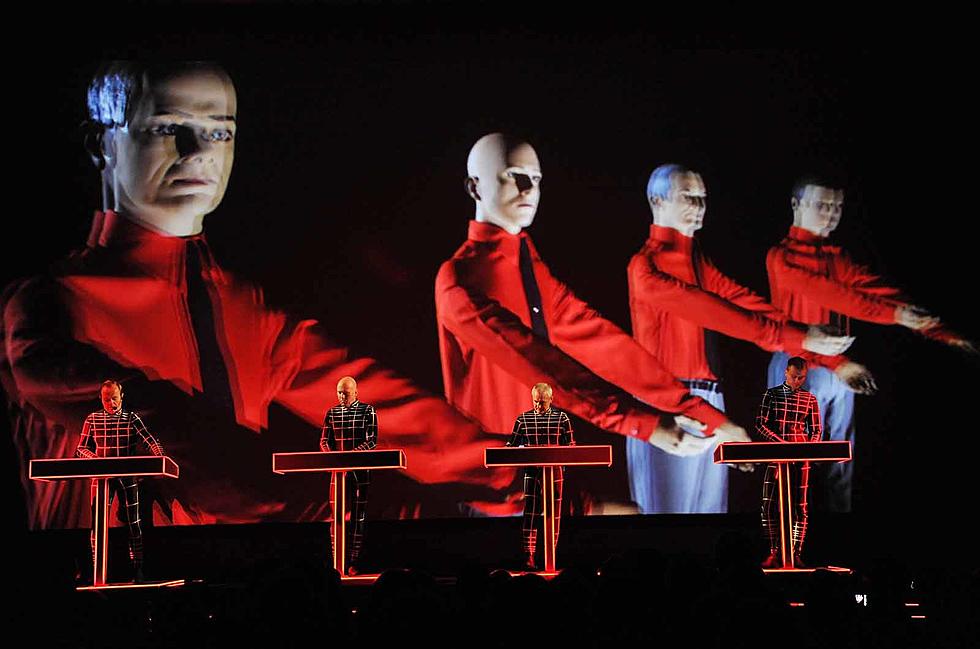
5 Reasons Kraftwerk Should Be in the Rock and Roll Hall of Fame
We've got five reasons why Kraftwerk deserve to be in the Rock and Roll Hall of Fame, but here's the primary one: Without them, electronic music as we know it today wouldn't exist.
If you think that's hyperbole, Martin Gore of Depeche Mode—who's also nominated for the hall in 2017—told this to the Telegraph in 2013. "For anyone of our generation involved in electronic music, Kraftwerk were the godfathers. Radio-Activity in 1975, Trans-Europe Express in 1977, The Man-Machine in 1978: they still sound modern today. The electronic scene blew up after those pivotal albums. There were a lot of punks who kind of moved into a futurist scene, looking for ways to take music beyond the confines of the rock genre."
However, Kraftwerk's legacy continues to endure today, decades after punk broke in the U.K. So how and why did the German group—whose core members for much of its existence were Florian Schneider and Ralf Hütter—evolve and become a Rock Hall-worthy inspiration? We examine five reasons why they deserve enshrinement.
- 1
Broad Musical Influence
As noted above, Kraftwerk were the patriarchs of new wave and synthpop acts such as OMD, New Order, Human League and Pet Shop Boys. However, the group's influence was diverse: Hip-hop pioneer Afrika Bambaataa & the Soulsonic Force sampled Kraftwerk on the groundbreaking 1982 single "Planet Rock," while guitarist Chris Stein admitted in The Mojo Collection: 4th Edition that Blondie was "thinking about Kraftwerk and Eurodisco" while making the percolating "Heart of Glass."
U2 and Coldplay are also fans: The former covered "Neon Lights" and the latter sampled "Computer Love" on 2005's "Talk." Even David Bowie was a massive Kraftwerk fan. The "Heroes" song "V-2 Schneider" is reportedly a nod to Schneider. “Kraftwerk were a huge influence on the early hip-hop scene, and they basically invented electro, which has had a huge influence on contemporary R&B and pop,” Moby told the New York Times in 2009. “Kraftwerk are to contemporary electronic music what the Beatles and the Rolling Stones are to contemporary rock music.”
- 2
Experimental Acumen
Prior to 1974's breakthrough Autobahn LP, Schneider and Hütter used Kraftwerk as a vehicle for sonic experimentation. Early albums such as 1971's Kraftwerk 2 are landmarks in ambient, abstract music, while 1973's Ralf Und Florian is a primitive encapsulation of the vibrant electro for which Kraftwerk would become known. Conny Plank—a Krautrock-associated producer who worked on Kraftwerk albums through Autobahn—helped steer this sonic evolution by having as much of a futuristic vision as the band members did.
- 3
Technical Wizardry
Part of the reason Kraftwerk sounded so distinctive is because its members invented, built or modified musical instruments to capture and communicate its singular sounds. In the mid-'70s, the band had a patent for electronic percussion pads; in addition, the group used a custom vocoder, oscillators and other gerry-rigged instruments to create its music. Such innovations were housed—and encouraged—at Kraftwerk's studio compound, Kling Klang.
- 4
Groundbreaking Performance
Kraftwerk redefined what live performance could look like. Sure, the group used movies and other multimedia elements for effect. However, its matching outfits and choreographed moves—not to mention, as the below performance demonstrates, unorthodox instrumentation—made the group a sensation. Plus, stunts such as using mannequins to represent themselves during live performances of the song "The Robots" functioned as sly social commentary on reality and technology.
- 5
Electronic Dance Music Pioneers
As noted in item No. 1, Kraftwerk inspired plenty of synthpop and new wave artists, including many dance-oriented acts. However, the group had a special impact on Detroit techno, a specific sound and movement that eventually spread worldwide by the late '80s and inspired electronic music into the '90s and beyond.
“Before I heard ‘The Robots’ I wasn’t really using sequencers and I was playing everything by hand, so it sounded really organic, really flowing, really loose,” Detroit D.J. and producer Juan Atkins told the New York Times. “That really made me research getting into sequencing, to give everything that real tight robotic feel.” Fellow Detroit techno icon Carl Craig added that Kraftwerk was “considered like gods. Black people could relate to it because it was like James Brown. It was just this kind of relentless groove.”
More From Diffuser.fm









